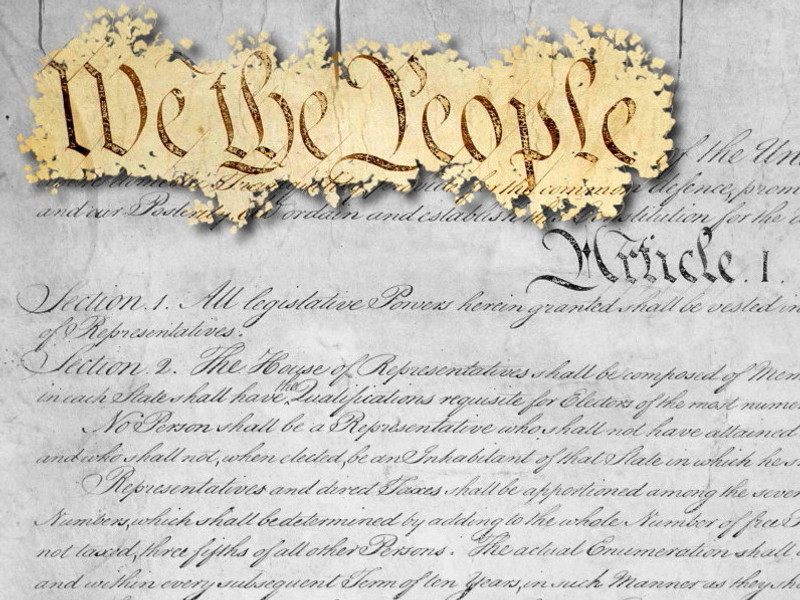
Welcome to Politics Bites, where every afternoon at It's a Free Country, we bring you the unmissable quotes from the morning's political conversations on WNYC. Today on The Brian Lehrer Show, Geoffrey Stone, a professor of Constitutional Law at the University of Chicago and Chairman of the American Constitution Society, explains the actual document behind the Republican plan to read the Constitution on the floor of the house.
Republicans organized a reading of the Constitution on the House floor today, in order to make a point that liberals who believe in activist government are acting outside of the founding fathers' vision. The Constitution, which allows wars, taxation, and regulation of business, and prohibits actions from states such as the levying of import fees on imports from other states, has changed much over the years with 27 amendments.
While the Bill of Rights is designed to protect individuals from the government, the Constitution also empowers the government and gives it mandated duties, Stone said. “For example, the federal government is required to provide to the states a republican form of government.”
Stone discussed some of the difficulties with adherence to a strict interpretation of the document, pointing out that under a strict interpretation of the Constitution, there would be no Air Force, since airplanes had yet to be invented.
The United States didn’t have a separate Air Force during World War II, even. They had an Army air force and a Navy air force, so there was an awareness of the problem. Finally people said this is ridiculous, and they recommended that the Constitution is meant to be flexible. It’s a document that was created over 200 years ago. The framers themselves, who were very far-sighted, and who were men of the enlightenment, understood that they needed to draft in generalities, and for the most part, that’s what they did. And those generalities were understood and intended by them to flexible and open to both interpretation and change over time.
In addition, noted Stone, the Constitution refers to the President as “him," which will inevitably face challenges from women running for the office in the future.
The Preamble to the Constitution is generally assumed not to have the force of law, but rather to be what Stone called “a useful piece of information to bring to bear in interpreting the body of the Constitution.” He said of the phrase “to promote the general welfare” is not a call for activist government but instead the statement of an overarching goal.
One of the ways that we promote the general welfare is by giving and respecting the powers of the states, so I don’t think that one can assume that that phrase necessarily anticipates a far-reaching federal government. The framers themselves, for the most part, did not envision themselves as creating a federal government with large powers. They wanted a federal government much more powerful than the Articles of Federation had established, which was a disaster, but they still believed in states rights, and they still believed that the federal government would be a government that enabled the nation to do what was necessary. So they would have given a more narrow understanding of “promote the general welfare” than simply saying that means the federal government can do anything that the federal government thinks promotes the general welfare.
Stone pointed out an interesting note about the Preamble. “We the People” was not in the language of the Articles of Confederation — instead it was “The States” who were coming together. Original drafts of the Constitution also said “The States” instead of “We the People”, but at some point a deliberate change was made.
There was a recognition that the United States was ultimately a bond formed among the people themselves, not just between the states.
A caller from Dyker Heights wondered who was going to get stuck reading the part of the Constitution defining some people, those in slavery, as “three-fifths” of a human being." Stone agreed that the original language contained several problematic clauses.
There are parts of the original Constitution that are certainly embarrassing... even the fugitive slave clause in the original Constitution, which requires states to return escaped slaves to their masters. Then there’s the importation clause, which essentially allows states to import slaves until 1808. So, yeah, there’s a lot in the original Constitution — and later — that’s embarrassing.
The framers were careful, however, said Stone, not to use words like “slaves” and “slavery”, so unless you knew the context, it wouldn’t be clear from the document itself.
A caller from Long Island liked the language in the Preamble that calls for a union “more perfect”, saying those words “leave a lot of latitude for change.”
Stone agreed that the 21st amendment repealing the previous 18th amendment of prohibition does point to the Constitution being a living document, but is mindful of the extreme difficulty of that sort of change.
The United States Constitution is the most difficult Constitution in the world to amend. The framers didn’t intend that... but what has happened is that it’s become so difficult to amend the Constitution that there has become, as a practical matter, a need for flexibility of interpretation.
As the lawmakers today read the entire document (omitting some parts, it turns out), those framers’ words will be heard by all, to interpret to the best of their abilities in the coming years.